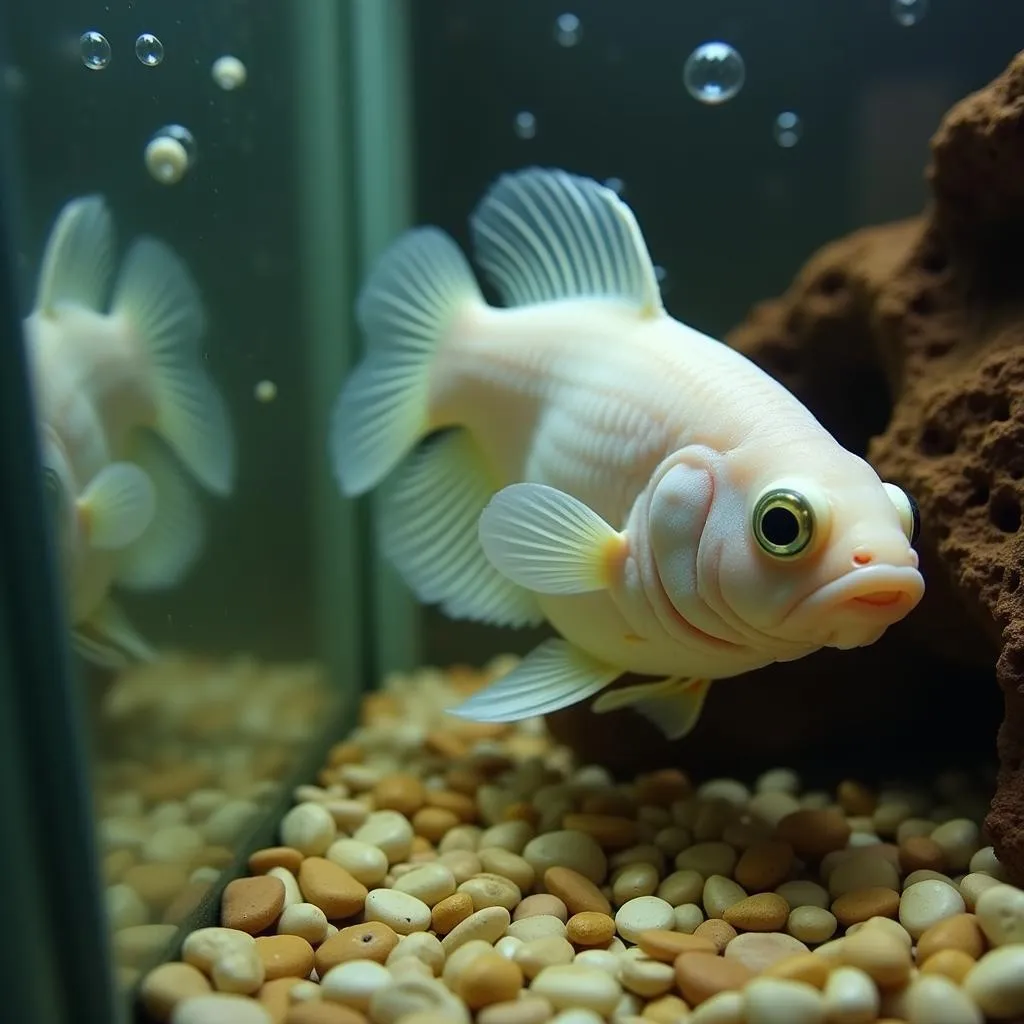Betta fish, those vibrant and feisty little creatures that grace many a home aquarium, are renowned for their stunning array of colors. But did you know that these colors aren’t always permanent? That’s right – betta fish can change colors throughout their lives! This fascinating phenomenon, often a source of curiosity and wonder for betta owners, is influenced by a variety of factors.
Let’s dive deeper into the captivating world of betta fish and uncover the secrets behind their ever-changing hues.
Why Do Betta Fish Change Color?
There are several reasons why your betta fish might undergo a color transformation. Understanding these reasons can help you better care for your finned friend and appreciate the complexities of their biology.
1. Stress: A Chameleon Effect
Just like chameleons, betta fish can change color in response to stress. However, unlike chameleons, whose color changes serve as camouflage, stress-induced color change in bettas is a sign that something is wrong in their environment.
Stressors for betta fish can include:
- Poor water quality
- Extreme temperature fluctuations
- Small tank size
- Lack of enrichment
- Bullying from tank mates
How to tell if stress is the culprit:
If your betta’s color change is accompanied by other behavioral changes, such as lethargy, loss of appetite, or fin clamping, it’s highly likely that stress is the underlying cause.
 Stressed betta fish hiding in a tank corner.
Stressed betta fish hiding in a tank corner.
2. Aging: The Natural Progression
As betta fish age, their color pigments naturally change. This process, similar to humans developing gray hair, is a normal part of their life cycle and shouldn’t be cause for alarm.
Typical color changes with age:
- Bright, vibrant colors may fade or darken.
- New colors or patterns may emerge.
- Some bettas may become duller overall.
 An aging betta fish with darker colors swimming gracefully.
An aging betta fish with darker colors swimming gracefully.
3. Diet: You Are What You Eat
Believe it or not, the food your betta fish consumes can influence its coloration! A diet rich in carotenoids, natural pigments found in certain foods, can enhance and brighten a betta’s colors.
Foods rich in carotenoids:
- Bloodworms
- Brine shrimp
- Krill
- High-quality betta pellets containing color-enhancing ingredients
Tip: Incorporate a variety of foods into your betta’s diet to ensure they receive a balanced nutritional intake and potentially enhance their natural colors.
4. Genetics: The Blueprint of Color
A betta’s genetic makeup plays a fundamental role in determining its color potential. Just like eye color in humans, betta fish inherit genes that dictate their base colors and patterns.
Interesting fact: Some betta breeders specialize in producing specific color variations, resulting in a vast array of stunning betta varieties available in the aquarium trade.
5. Marbling Genes: A Dynamic Display
Certain betta fish possess a gene that causes their colors to “marble” or change over time. This marbling gene can lead to fascinating transformations, with new colors and patterns emerging as the fish ages.
Marbling can be unpredictable:
While some marbled bettas exhibit dramatic color shifts, others may only experience subtle changes. The marbling process can continue throughout a betta’s life, making each individual unique.
Can Bettas Change Color Back?
The answer to this question depends on the underlying reason for the color change.
- Stress-induced color change: If the stressor is identified and addressed promptly, bettas can often regain their original colors.
- Age-related color change: This type of change is generally permanent, as it’s a natural part of the aging process.
- Diet-related color change: Feeding your betta a diet rich in carotenoids can help maintain and enhance their colors, but it may not reverse fading caused by a previous poor diet.
- Marbling gene: Color changes due to the marbling gene are typically permanent and will continue to evolve throughout the fish’s life.
Do Black Bettas Change Color?
Black bettas, known for their striking appearance, can indeed experience color changes just like any other betta variety. The factors influencing their color changes are the same as those mentioned earlier, including stress, age, diet, and genetics.
Caring for Your Color-Changing Companion
Regardless of the reasons behind your betta’s color changes, providing optimal care is crucial for their overall health and well-being.
Key aspects of betta care:
- Spacious tank: A minimum of 5 gallons is recommended to provide ample swimming space and reduce stress.
- Clean water: Regular water changes (25% twice a week) are essential for maintaining good water quality.
- Appropriate filtration: A gentle filter will help keep the water clean without creating strong currents that bettas find stressful.
- Stable water parameters: Maintain a temperature of 78-82°F, pH of 6.5-7.5, and low levels of ammonia, nitrite, and nitrate.
- Enrichment: Provide plants, caves, and other decorations to create a stimulating environment.
- Balanced diet: Offer a variety of high-quality betta pellets, frozen foods, and occasional live treats.
Do Bettas Change Color? Yes, and It’s a Testament to Their Complexity
The ability of betta fish to change color is a testament to their fascinating biology and adaptability. By understanding the factors that influence these color changes, we can better appreciate the nuances of these captivating creatures and provide them with the care they need to thrive.
Remember, if you notice any sudden or drastic color changes in your betta, particularly if accompanied by other behavioral changes, consult a qualified aquatic veterinarian to rule out any underlying health concerns.
FAQs
1. How long does it take for a betta fish to change color?
The time frame for color change can vary greatly depending on the cause. Stress-induced changes can happen rapidly, while age-related changes occur gradually over months or years.
2. Is it normal for my betta’s colors to fade slightly after I bring it home?
Yes, it’s common for bettas to experience temporary color fading due to the stress of transitioning to a new environment.
Yes, bettas can change color due to stress, age, diet, and genetics.
4. Can I control my betta’s color changes?
You can influence color vibrancy through a healthy diet and stress-free environment, but you can’t control changes due to genetics or the marbling gene.
5. My betta’s colors have changed significantly, and it seems lethargic. What should I do?
Sudden, drastic color changes accompanied by behavioral changes could indicate illness. Consult an aquatic veterinarian immediately.
Do you have more questions about your aquatic friends? Check out our article on “What Color Are Shrimp?” for more insights!
Need help creating the perfect habitat for your color-changing betta? Contact us at 0373298888, email us at [email protected], or visit us at 86 Cầu Giấy, Hà Nội. Our team of experts is available 24/7 to assist you!

